
“There is a common assumption that the world’s water supply is huge and infinite. This assumption is false. At some time in the near future, water bankruptcy will result.” Maude Barlow, Council of Canadians
Water shortages, Drought, Limited water usage allowed, Day-Zero and Water consumption – these are some of the major focus points amongst South Africans over the past few years. With South Africa being amidst one of the most brutal droughts in many decades, South Africans are forced to look at alternative ways of saving water and be sensible when using water.
The city Cape Town was recently forced to encourage water conservation and limit water consumption to 50 litres per person. Although water seems to be everywhere, potable drinking water is running dangerously low and the reservoirs and dams are running empty. The true reality is that, very little can be done with 50 litres on a daily basis, as seen in the display below.
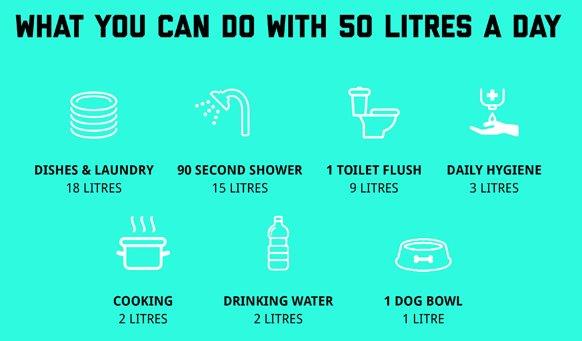
Businesses, universities, scientist and engineering groups have been working on various possible solutions day and night to address this crisis in South Africa, but to implement them take time and is a costly affair. Ideas such as Solar-Powered Water Desalination, Recycling Grey Water, Improved Filtration Systems, Rainwater Collection Systems, Dew Traps and disinfecting contaminated water are all on the table for review and possible implementation.
What is even more shocking is that, not only is South Africa facing this water shortage challenge, but according to a recent Global News article, 5 billion people world-wide could be affected by water shortages by 2050: UN Report. With the constant population growth and global warming, the demand for water is rising, while the supply is plunging, the 2018 edition of the U.N World Water Development Report has warned.This forces one to take a closer look at the operations within AESSEAL, and what this business is doing to help other industries address this crisis. Over the past several years there has been significant growth in the use of mechanical seals in the processing industries. Seals manufactured by AESSEAL® have been used successfully in a variety of applications. The growth in mechanical seal use can be attributed to the following factors:
- Traditionally, many sites used mechanical packing in their pumps. The introduction of smaller pumps operating at higher speeds made mechanical packing a less desirable sealing alternative.
- More stringent Health and Safety regulatory controls have made product leakage unacceptable. Fluid leakage poses a health and safety threat as well as being a housekeeping nuisance.
- As the cost of raw materials has increased, the need for reliable fluid sealing has increased. Yield loss of expensive process fluids can be reduced by positively sealing the process equipment.
- Mechanical packing damages the rotating equipment. Shaft sleeve wear and bearing failure caused by excessive leakage are common complaints. Additionally, chemical attack of the concrete base and ductile iron pump components occurs when corrosive chemicals are allowed to leak from packed glands.
- Periodic maintenance attention is required to constantly monitor and adjust packed glands.
- Reduction in costly flush water can occur when using properly designed and specified mechanical seals. The cost of clean water, process evaporation and waste water treatment makes the conversion to mechanical seals beneficial and cost effective.
- Many seal chambers operate under vacuum conditions. Positive sealing from properly designed mechanical seals eliminates air ingress through the seal housing. This section explains how mechanical seals and water management systems designed and manufactured by AESSEAL plc have been used successfully in industry. The information outlines the previous wasteful practices and the benefits of the newly adopted water management systems.
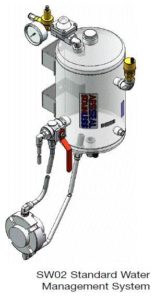
AESSEAL Water Saving Solution
AESSEAL plc began developing a range of modular systems which would bring about a revolution in mechanical seal support methodology. One of the first systems to use this revolutionary concept was the SW02 water management system. AESSEAL plc have sold thousands of water management systems, usually in combination with the CDSA double seal. The systems are maintenance friendly, requiring no external compressed air or gas pressurisation. They are also largely self-regulating and self-operating and do not require any manual intervention for refilling. The total annual operating cost of a CDSA seal and SW02 water management system would give a typical return on investment of around 200 days.
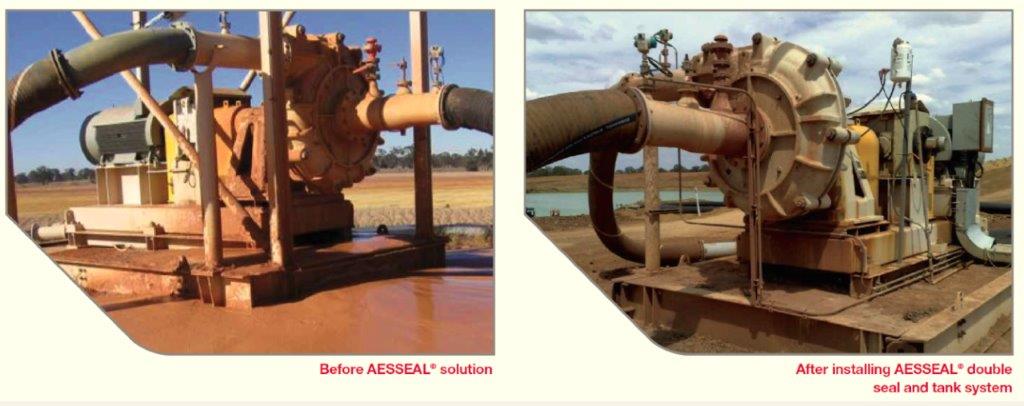
Typical mining pumps as seen above can create safety hazards and waste thousands of litres of water on a daily basis. The above can be eliminated with a properly-chosen double mechanical seal and a support system. A double-seal has two sets of faces ; one set sealing to the process fluid and one set sealing the atmosphere, with a barrier region in between the faces.
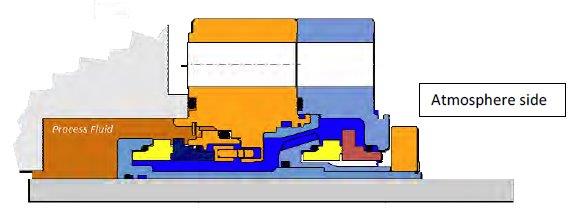
Diagram of typical double mechanical seal showing inboard seal faces sealing to the process fluid, the outboard seal faces sealing to the atmosphere, and a (blue) barrier fluid in between.
The largest diamond mine in the world which is located in an extremely arid region of Africa, and where water is at a premium, utilised AESSEAL’s water saving solution. Large Warman F-frame pumps were sealed with gland packing which required 19 gpm of gland water per pump. To reduce water consumption in 2004-2005, double mechanical seals and tank systems were fitted to 18 Warman X4 E-frame, and 12X10 F-frame slurry pumps at Plant #2. Currently, these 18 seals are running fine with reported total savings of 1.1 billion gallons of water with a value (in this desert country) of $3.9 million.
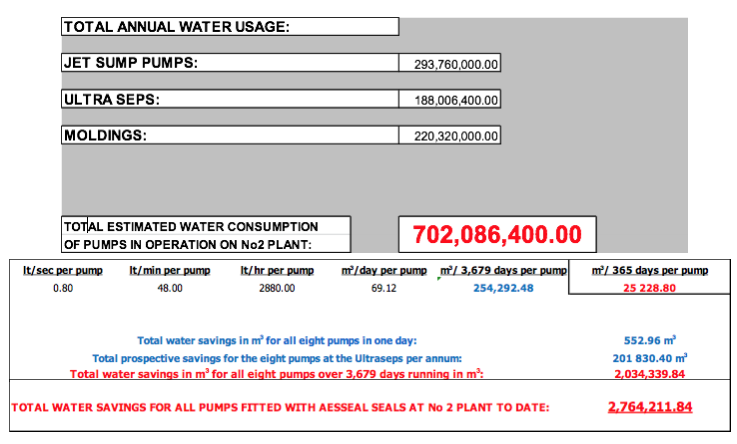
Double mechanical seals and tank systems eliminate all of the problems associated with packing and can greatly reduce a mine’s water footprint, while also reducing the manpower required to care for the packing and increasing the uptime/availability of the equipment. In those cases where the process is sensitive to dilution, double mechanical seals can save millions of dollars per year in lost product.


